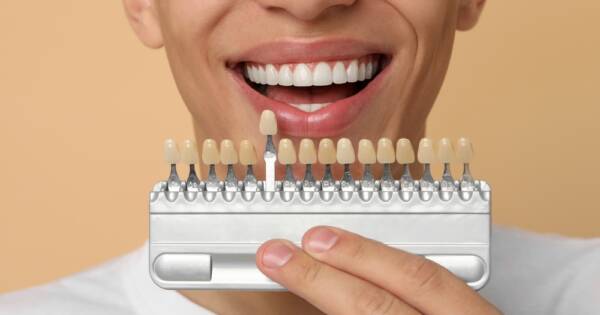A bright, white smile is often associated with health, beauty, and confidence. With countless teeth whitening products on the market—ranging from professional treatments to at-home remedies—it can be challenging to determine which methods actually work and which ones are just hype. Understanding the science behind teeth whitening can help you choose the most effective and safest option for achieving a dazzling smile.
What Causes Tooth Discoloration?
Tooth discoloration can be categorized into two types: extrinsic and intrinsic stains.
- Extrinsic Stains: These affect the outer layer of the tooth (enamel) and are often caused by food, drinks (like coffee, tea, and red wine), smoking, and poor oral hygiene. These stains can usually be removed with surface whitening products.
- Intrinsic Stains: These are deeper stains within the tooth’s structure (dentin). They can result from aging, trauma, certain medications, or excessive fluoride exposure. Intrinsic stains are more difficult to treat and often require professional whitening treatments.
How Teeth Whitening Works
Teeth whitening products contain bleaching agents, such as hydrogen peroxide or carbamide peroxide, which break down stains on the enamel and dentin. These agents release oxygen molecules that penetrate the tooth surface and dissolve discolored compounds.
The concentration of the bleaching agent determines the strength and effectiveness of the whitening treatment. Professional treatments generally have higher concentrations and produce faster results, while at-home products have lower concentrations to ensure safety.
What Works: Effective Whitening Methods
1. Professional In-Office Whitening
This is the most effective teeth whitening option. Performed by a dentist, in-office treatments use a high-concentration peroxide gel combined with special light or heat to accelerate the process.
Pros:
- Immediate results (up to 8 shades whiter in one session)
- Supervised by professionals, minimizing risks
- Ideal for both extrinsic and some intrinsic stains
Cons:
- Can be expensive
- Potential for temporary tooth sensitivity
2. At-Home Whitening Kits (Dentist-Supervised)
These kits include custom-fitted trays and a professional-strength whitening gel provided by a dentist. While the results take longer than in-office treatments, they are more effective than over-the-counter options.
Pros:
- Convenient and affordable compared to in-office treatments
- Gradual whitening over 1–2 weeks
- Custom trays ensure even whitening
Cons:
- Potential for sensitivity if not used correctly
3. Whitening Strips and Over-the-Counter Products
Whitening strips and gels are popular for at-home use. They contain lower concentrations of peroxide and can brighten teeth over several weeks.
Pros:
- Affordable and easy to use
- Effective for mild extrinsic stains
Cons:
- Results are less dramatic than professional treatments
- Risk of uneven whitening
What Doesn’t Work: Ineffective or Misleading Methods
1. Whitening Toothpaste
Most whitening toothpastes remove surface stains through mild abrasives but don’t contain enough peroxide to bleach teeth. They can help maintain results but won’t significantly whiten teeth.
2. Charcoal Toothpaste
Charcoal-based products claim to whiten teeth, but there is little scientific evidence supporting their effectiveness. Excessive use can also wear down enamel, causing long-term damage.
<h43. Natural Remedies (Baking Soda, Lemon Juice, Coconut Oil)
Home remedies like baking soda and lemon juice are widely promoted online, but these methods can be abrasive and harm tooth enamel. Oil pulling with coconut oil may improve oral hygiene but has no proven whitening effects.
A Brighter Smile Backed by Science
The science behind teeth whitening lies in the power of peroxide-based agents that break down stains at a molecular level. Professional treatments and dentist-supervised at-home kits are the most effective options for achieving long-lasting results. Over-the-counter products can work for minor stains but won’t deliver dramatic changes. Avoid unproven remedies that can damage your teeth, and consult with a dental professional to find the best whitening solution for you.





